“This book is probably not what you might expect it to be,” says Melissa Arnot Reid of her new memoir Enough. Reid is the first American woman to summit Everest—and survive the descent—without supplemental oxygen.
For one, she emphasizes that her book is not just another contribution to the Everest canon. In fact, until the last minute, the book’s title was actually This Is Not a Book About Everest. She wanted readers to receive this disclaimer upfront, so they wouldn’t be “wildly disappointed.”
Instead, her book is a deeply personal, seemingly no-filter account of her life’s journey. Released on April 1, Enough recounts everything from Reid’s difficult childhood and relationship with her mother, to lonely nights in the back of her truck in Montana, to many misadventures in love. Of course, she also discusses her extensive experiences climbing and guiding Everest, Rainier, and other peaks.
Filled with footnotes where Reid takes her off-the-cuff voice and honest takes to the next level, Enough is a book of our times, wherein candor, confessions, and embracing the bad along with the good seem to rule more by the moment.
“I’ve been really afraid of being rejected if I’m truly known,” Reid told me from a hotel room in New York City, where she’d be kicking off a book tour the following day. That’s why this no-holds-barred approach to telling her story represents real bravery on par with her accomplishments in alpinism.
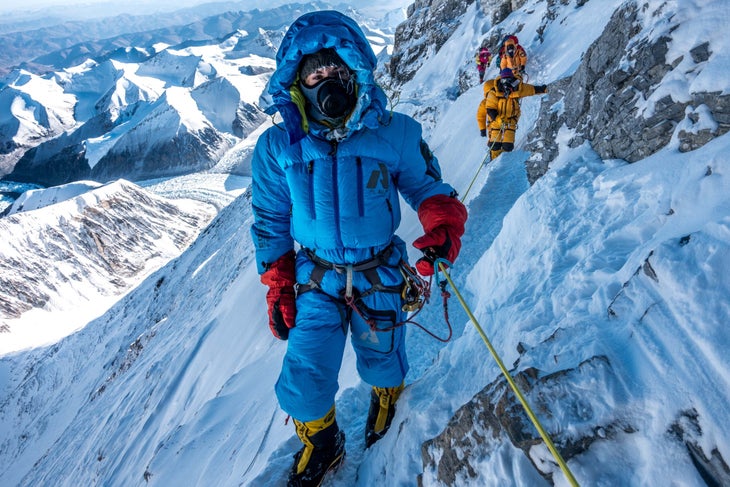
It takes courage to voluntarily share everything Reid includes in Enough. She reveals her most embarrassing childhood stories. She grapples with her exploitation of romantic partners to get ahead in the industry. She shares tales about named prominent alpinists that reveal tension and flaws. And she relives traumatic events and loss.
Since the scope of Enough ends in 2021, one subject Reid doesn’t explore in the book is her journey into motherhood, while continuing to work as a mountain guide. “I’ve gone through this really wild personal experience of finding out that as a female athlete who works in the big mountains and becomes a mother, people sort of assume you don’t exist anymore,” Reid reflects.
With a six-year-old daughter, a two-year-old son, and a fellow guide as a partner—he’s currently on a six-week stint in Alaska—Reid describes her life these days as a “crazy Tetris game.” Yet she also manages to run her nonprofit the , which she founded in 2012 to support the families of high-altitude workers who’ve lost their lives in the mountains. Recently, the Juniper Fund also took over the work of the Khumbu Climbing Center, previously part of the . “That’s added a whole new layer of opportunity and work for us,” she says.
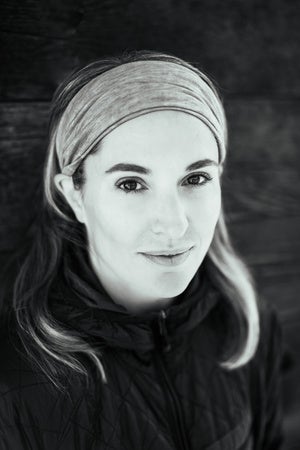
While Reid acknowledges that Enough is heavy at times, she encourages readers “to look at the darkness” in order to “appreciate the light.” She emphasizes that “it’s important not to look away from what we’re most fearful of.” Clearly, that has been, and continues to be, a guiding principle of her life. It’s the modus operandi of her book, too.
We caught up with Reid to find out the triple entendre behind the title, why releasing the book feels “really scary,” what she thinks about technological change on Everest, and the next book project on her mind.
After the interview, we’ve also included an excerpt from Enough.
This interview has been edited for clarity and concision.��
Want to catch Reid in person? She’ll be speaking at the �����ԹϺ��� Festival in Denver, Colorado, May 31–June 1. .��
Watch an excerpt from our interview with Melissa Arnot Reid
Climbing: When did you decide you wanted to write a book? And when did it become a concrete project you were committed to?
Melissa Arnot Reid: I had been thinking about writing a book for a really long time. I had been approached really early in my Everest guiding career about writing a book because my story was a little different from some of the other Everest stories. But I knew that I �徱���’t want to write a story about Everest and I �徱���’t want to write a story that wasn’t complete.
I’ve been a lifelong writer, which most people don’t know. During the pandemic, I actually had a minute to not be guiding and constantly on trips and I had a two-year-old. I just really decided to dedicate myself to putting all the stories that I was holding in my heart onto the page.
Climbing: Count us among those who �徱���’t realize you’ve been a lifelong writer! What kind of writing do you enjoy?
Reid: I’ve been writing since I was really really young. Writing is one of the only things I’ve been naturally talented at. When I was in fifth or sixth grade, I started writing a lot of poetry. I have all of it still, which is both amazing and cringey. I spend a lot of time alone and I spend a lot of time reflecting—especially as a guide, I’m a natural storyteller. So to be able to bring all that together onto the page is incredibly meaningful for me.
Climbing: A dream in the making since fifth grade. So this book contains a lot of what I imagine are stories you’ve never told before—about your childhood, past life partners, and experiences in the mountains with well-known climbers. Which of these stories were you most hesitant about putting out in the world?
Reid: Honestly, this whole book makes me really nervous because my public image has been really curated and protected by myself. I’ve shared the expected story of perseverance and achievement, but I’ve left out a lot of the nuance. I went there with this book. I made myself a promise when I started writing that I would write as viscerally and honestly as I could and edit backwards if I needed to. It’s so essential to have the whole story out there.
I’ve had a really complicated life—both really terrible things that were not my choice and terrible things that were my choice. I take you—the reader—on that journey with me. I’ve been really afraid of being rejected if I’m truly known. So this whole book is really scary because it’s me on all my good days and really bad days, my good choices and my really bad choices. Not everybody’s going to love it. I tell some critical stories from my perspective of named people that—if you’re in the outdoor world—you will find familiar. That doesn’t scare me because those people lived it with me. I do believe that knowing somebody else’s perspective of an experience can be really beneficial for us all.
Climbing: Are you expecting to hear from folks who you told stories about now that the book is out?
Reid: If you read the book, you’re going to be like, “Gosh, I wonder what so-and-so thinks of this.” If you’re thinking that, it’s very likely that I already talked to so-and-so face-to-face. I tried to give people who I speak critically about at least a head’s up that it’s not a highly refined and curated story of our perfect moments. But I don’t spare myself from that same level of critique. Somebody else’s perspective is going to be really different from mine. I don’t want to say this to be baiting, but people who are in the story that I speak critically about also know what I �徱���’t say. And that’s quite a lot actually.
Climbing: Having read Enough, I also want to reinforce what you’re saying about critiquing yourself alongside others. It’s not like you’re painting yourself out to be the hero of the story.
Reid: No, I am not. I have made a lot of mistakes. But you can be really imperfect and make tough choices and have low character moments and still be deserving. That’s sort of the journey that I’ve gone on in my life.
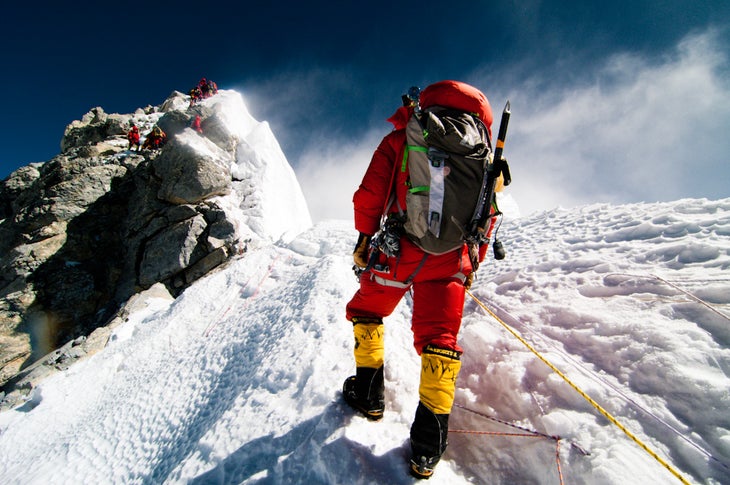
Climbing: Some of the experiences in the mountains that you reflect on in this book are quite tragic. Did the process of telling these stories change how you view those events? In other words, did the writing process alter your perspective on the past?
Reid: It’s been incredibly therapeutic. It’s been really interesting to see what stories continuously play in the background of my mind. The biggest thing I’ve learned through the process is some things that I thought were scars from my past were actually just scabs and can bleed easily again. It’s a good place to remind yourself that it’s okay to continue healing.
Climbing: Are those scabs more from your family life or from experiences in the mountains?
Reid: I’m really exceptional at compartmentalizing. It’s made me really good in both emergency medicine and guiding. It’s allowed me to keep a really calm head, but that also doesn’t allow you to process big trauma. I was present for two back-to-back catastrophic seasons on Everest with a lot of death and trauma, while simultaneously going through a really difficult time in my personal life. It actually feels emotionally appropriate for me to revisit those things with some tenderness instead of stoicism.
Sixteen people dying is something that should affect you—and then, of course, I had a really complicated childhood. It feels good to be able to share that side of my life. I’ve always disliked when people were asking about my story, like, “You must have been climbing since you were little. Your parents must have been really outdoors people.” It’s always graded me—if only I could tell you how that’s not been my story. And there’s never space. Now I have 304 pages to tell you all about it.
Climbing: A few months ago, you shared on Instagram that “enough”—which is the title of your book—ought to be the word of the year. That feels pretty on-point right now. Have your thoughts on “enough” as the word of 2025 evolved at all now that we’re three months into the year?
Reid: ”Enough” is this incredibly beautiful word because it means so many things. It could mean that you are enough. It could mean that you’ve done enough. Or it could mean that you’ve had enough. In my case, it is truly all three.
When I think about “enough” being the theme of the year, it’s really all three of those things. I am enough: I don’t need to be anything other than what I am. So are all of us. I have done enough and I also can do more. But I’ve definitely had enough. When you’ve had enough, you get pretty activated to see change. That’s sort of where I’m at right now.
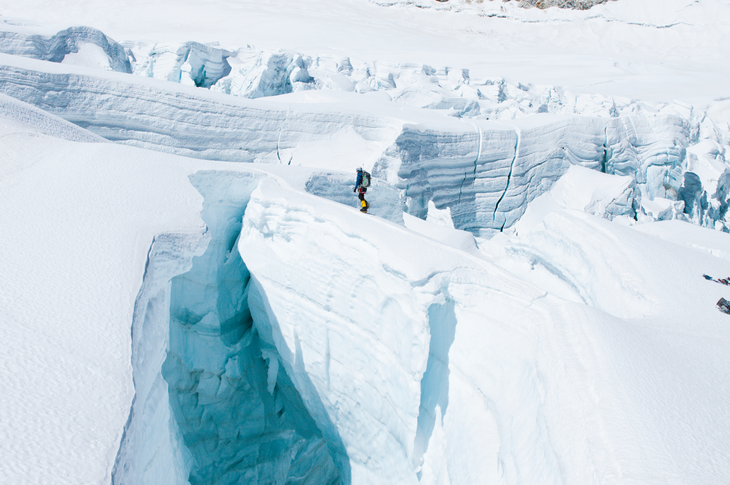
Climbing: As we enter the 2025 Everest season, the mountain has become more commercial than ever. We’re also seeing the , and drones are becoming more of a presence on the mountain. How has your view of Everest changed since your first climb? And as a longtime guide, what are your thoughts on where Everest is headed?
Reid: My first season on Everest was 2008. As we were trekking through Khumbu into basecamp, the porters were starting to use Nokia flip phones and there were cell towers. The conversation was: “Technology is going to ruin adventure.” This is pre-smartphones. I remember feeling like it was such a silly thing. Fast forward quite a long time, and technology has evolved the adventure that is Everest in myriad ways. How people choose to climb and how the commercial operations run is a huge part of that.
Climbing: What’s happened since you were last on Everest?
Reid: My last season working on Everest was 2016. In the last nine years, there has been so much change that it’s hard to even articulate. I’m still very involved in the industry—I run the Juniper Fund so we’re incredibly involved in what’s happening. A lot of the commercial guiding has shifted to really big Nepali outfitters, so foreign operators like [Lukas] Furtenbach have to continue to be competitive in the ways that are meaningful to them. They also have to answer to what people want.
My personal opinions on truncating an adventure into achievement alone probably aren’t really welcome in that commercial environment. Something that I’ve always thought was really wonderful about adventure is it separates you from the ways that we distract ourselves in our daily life. If you don’t allow yourself that separation, it’s not to say you can’t have a tremendous adventure, you’re just having a different one.
I’m generally accepting that things are going to change and we have to witness it and act individually as responsibly as we can. But for the armchair Everest community, which is vast and vocal, this is an interesting time.
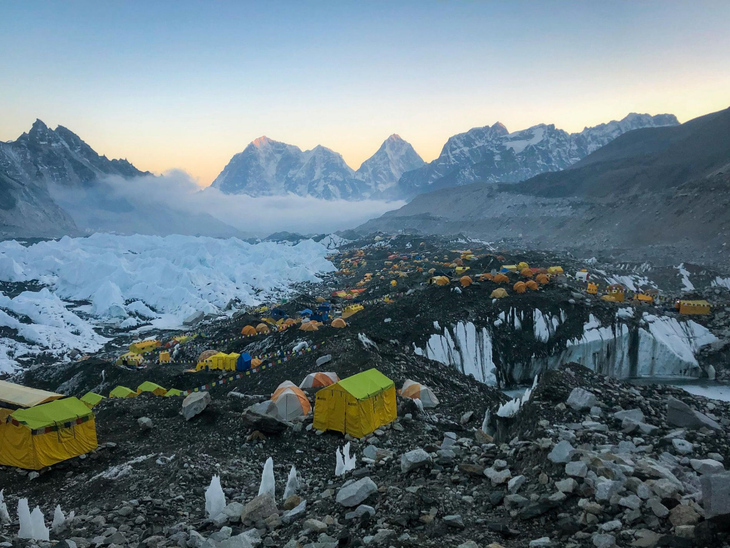
Climbing: Does it make you wish you were still guiding on Everest to bear witness firsthand to all the changes unfolding?
Reid: Through the Juniper Fund, I’m really involved in the worst side of the industry because we get involved as soon as there’s been a tragedy and we stay really involved with those families’ lives really forever. I get to be really up close and I can be very honest and tell you I haven’t really had a single season pass where I’ve thought, “I just wish I were guiding on Everest right now.”
That’s not to say that I won’t go back. When I was guiding on Everest my first year, I was 24. I remember looking around and thinking, “I’m by 20 years the youngest guide here.” So, I could take a whole 10-plus year break and come back and just be the normal age range of other guides. It would have to be really specific clients and a really specific situation for me. But I feel as involved as I want to be in it.
Climbing: Let’s talk more about your work with the Juniper Fund. What changes have you noticed since you founded this nonprofit? Have you observed any improvements or changes in the working conditions or risk level for Sherpas and other high-altitude workers?
Reid: Decline in risk is really interesting. So many of the families we serve are [impacted by] absolutely objective hazard situations—an ice fall, rock fall, a big avalanche. We are in the areas where those things occur. We have seen a huge shift in training for high-altitude workers with an emphasis on prevention from local outfitters. So, they’re training their workers to prevent the preventable things, which is excellent and is making a difference. We always have a hard time measuring, for example, the deaths that don’t occur because of preventative measures. And the numbers don’t actually tell that story very well because of the nature of accidental death.
But the conversations and the employment structures have changed a lot. It used to be foreign operators were the biggest employers of high-altitude workers, through a local agency. The largest employers [now] are local agencies who are running the entire guide service. I think the local agencies have a really close conversation with what the needs of the workers are. I can’t say that it’s better at this moment, but I do think that these conversations and the visibility have shifted a little bit.
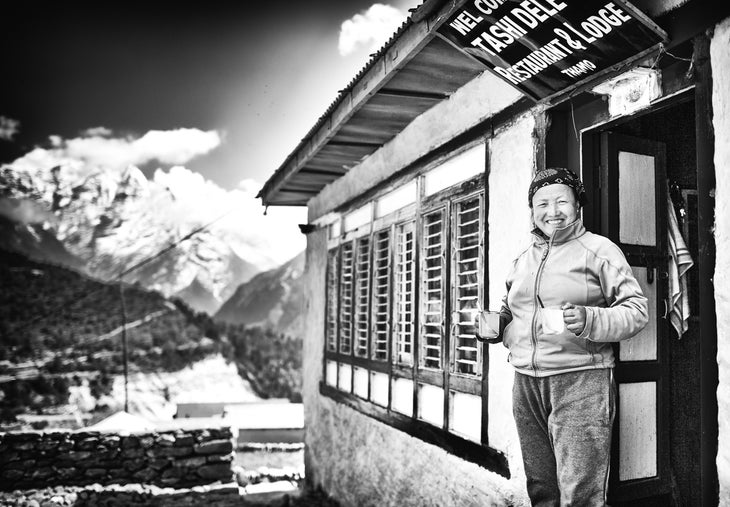
Climbing: Talk more about the shift in how these high-altitude workers are perceived.
Reid: We collectively used to think of Sherpa as uneducated, untrained laborers just carrying loads and it’s eminently clear now that that is just not the case. There are Nepali-born, high-altitude mountain guides who are of equal skillset to any foreign guide—workers who have chosen this as their vocation and even have higher education, and this is where they want to be. Our landscape of understanding has changed. In supporting families with the Juniper Fund, we’re always listening to the families and grow our actions based on what they tell us: How do you feel supported? What more would you like?
Climbing: This work you’re doing relates to the ending of the book, which I loved: the epilogue with Lhakpa Tenzing Sherpa, the son of a Sherpa who died in the mountains on a climb with you. Has Lhakpa continued climbing since your summit together in the Cascades? What has he been up to since the book ended in 2021?
Reid: He lives in Seattle and works in finance. He’s generally an adventurous guy, not specifically to climbing. I can’t speak on his behalf, but I can imagine he has a really conflicting relationship with the mountains because of his experience as a child and losing his dad when he was really young. But anybody who knows him loves him, because he’s just an exceptional, bright person and a wonderful human to have in the world.
Climbing: Does this make you want to write another book at some point? Or do you have any other big goal that you’re shifting your focus to next?
Reid: I’m interested to see how the book is received, because it isn’t going to be the book people think it’s going to be. How it’s received doesn’t really impact what it means to me because it’s so important to me.
But yes, I have another book that I am working on already. In 2016, right after I summited Everest without oxygen, I did a trip with Maddie Miller, a girl who I was mentoring. We climbed the high points of all the states, so the 50 high points in 41 days, 16 hours, and 10 minutes. And Maddie set the speed record at that time. We documented it, but we have a lot of stories from that experience. And it’s really like Maddie’s coming-of-age story as a 21-year-old in her last year of college. I’m really hoping to be able to bring that story out to the world because comparatively to Enough, it’s a fun adventure challenge.
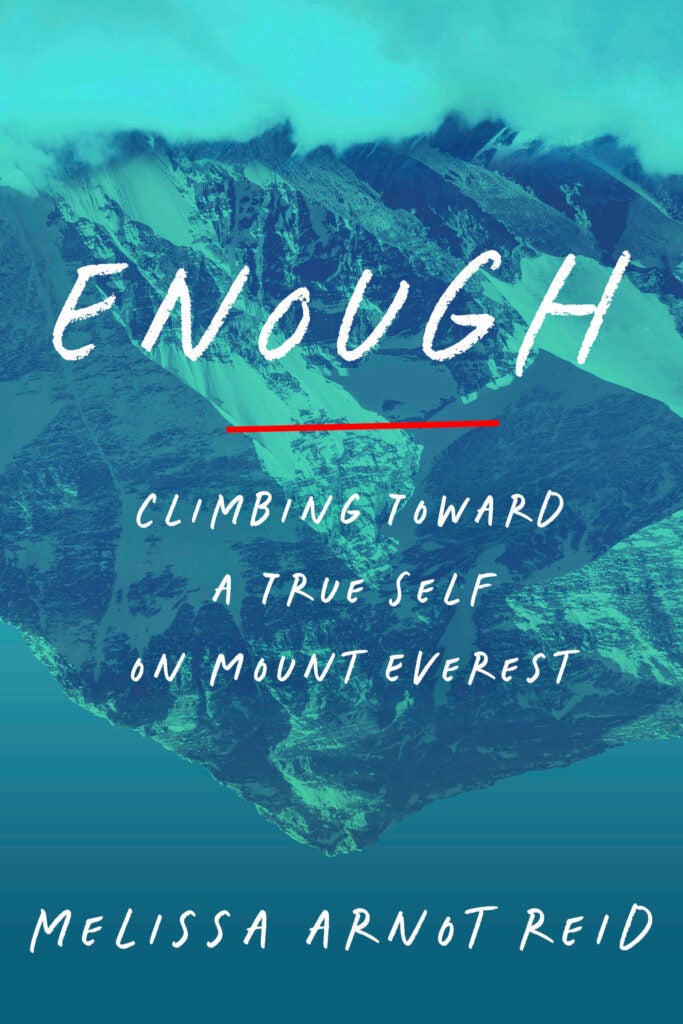
Excerpt from ���Դdzܲ�����by Melissa Arnot Reid
Excerpted from ENOUGH: Climbing Toward a True Self on Mount Everest by Melissa Arnot Reid. Copyright © 2025 by Melissa Arnot Reid LLC. Published in the United States by Crown, an imprint of the Crown Publishing Group, a division of Penguin Random House LLC.
You can purchase Enough or wherever books are sold.
Obama and the Dalai Lama and Americans wouldn’t be given any more visas that season.
I exhaled with grateful relief. A change in plans I could deal with. “Don’t say it’s bad news unless someone died!” I joked.
The change meant that climbing from Tibet was out, so Pasang and I decided we would climb the route in front of us, on the south side of Everest. We were here and that was all that we could do, so we might as well enjoy it.
That night, I fell into a restless high-altitude sleep. I woke up every hour, hoping that when I opened my eyes the first light of dawn would have arrived. When it finally did, it came with the distant clamor of voices on the radio. I peeked out of my tent to see Dawa waving his hands and frantically motioning me to come up to his tent. I put on my down jacket and boots and headed up, unsure what the urgency was about.
“Meli, there was an accident. A big one. All Sherpas.” He paused and I watched his Adam’s apple bob as he attempted to swallow. “Many are dead.” The words hung in space until he loudly exhaled. “Can you go up? They need help.”
I took a breath to calm the flood of adrenaline that rose within me. Of course I would go. I assumed the familiar role of responder that I had practiced in my medical work, calm and intentional with my movement. I hastily departed to get dressed, planning to climb up to the accident site and help however I could. I �徱���’t have a harness or crampons, so I borrowed them from another climber and went straight to the helipad at the edge of camp, where all the rescuers had assembled. Since I had significant medical training and experience, it was quickly decided that I would fly up first with medical equipment. No one was totally sure what had happened at the accident site, but what little news we had was grim. A large number of local workers had been climbing together when the avalanche came swiftly down on top of them. Some were dead.
Some were missing. And some were injured and desperate for care.
I boarded the helicopter, and a moment later we left solid ground and headed into something unimaginable. Tragedy was not new, nor was my facing it. Nearly every season that I had worked on Everest had included some sort of rescue or an up-close view of a tragic accidental death. That was part of the deal with the biggest mountains in the world. But I had never seen, nor even imagined, death on this scale. I had no time to wonder what it would be like—I just went in, closing my heart to the truth of what was in front of me and doing the job I was asked to do. Like so many times before, I knew I needed to seal off my emotions and do the task at hand. I could sort through the tragedy of it all later, and I would.
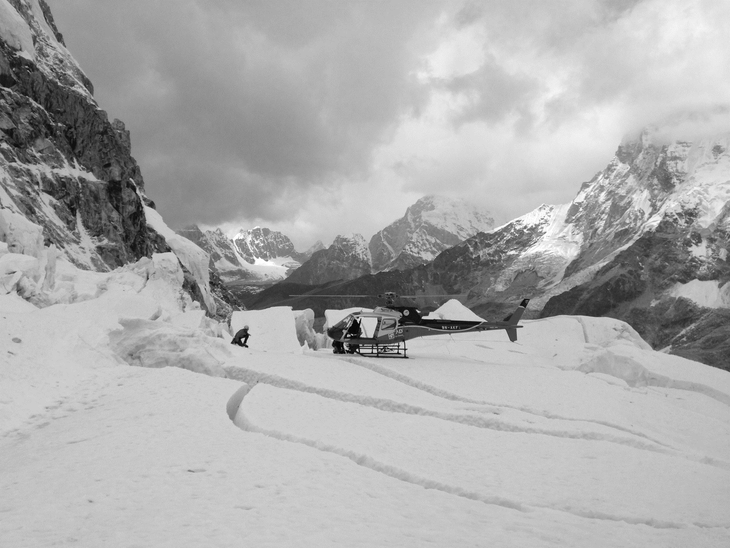
April 18, 2014
The air feels whisper thin and unoccupied. I stop, holding my own breath to see what I can hear. Nothing. Not a crack, nor a creak. Not even the sound of stillness. Here, everything is gone. Life is gone. It is as though something or someone has pressed pause on this moment in time and I am somehow allowed to look around and feel the absence of everything. Newton said that energy cannot be created or destroyed; it can only be transferred or changed from one form to another. I have felt that transfer many times, something turning into something else with the flip of a switch. But I wonder if Newton ever dreamed of something like this, a place where the earth opens and absorbs all the energy, leaving no trace of it behind.
The borrowed crampons on my feet are heavy and unfamiliar. But they talk to the glacier ice in the same familiar conversation of crunching and piercing, offering some comfort. I am at almost 20,000 feet and my lungs are burning like structure fires, telling me to slow down. The sound of my breath and the booming of blood flow is filling my ears now like the white noise of an ocean
in chaos. It is not rhythmic. It is not peaceful. I move quickly, following the chucks of broken ice and the splashes of red blood that are smattered about. A backpack rests near a crimson stain in the snow. I don’t know who it belongs to. I wonder if he lived or died. I keep moving, up and then down, covering every inch of the area in search of something missed. I am both eager to find something and dreading what it will be. And then, I see him. Upside down, suspended by the rope and the universe. Stopped right there and buried partially under hundreds of pounds of ice; entombed. I stop, allowing my breath to ease enough to speak. Keying the mic on the radio, I relay the news that I have found another one. We need to go check it out. The other rescuers rush from behind me, climbing up the slight incline around giant crevasses and blocks of ice, and continue to the broken battlefield ahead. I stay where I am, watching over them. I feel the weight of what might happen next pulling at us all. It feels like the mountain has only partially exhaled, and there is more to come. I do not want to be caught in her breath or see another life absorbed into her flanks. I will my soul to communicate with hers as I scour the slopes for any sign of movement. A helicopter lands below me and I see another body wrapped tightly, small and life- less. It is loaded in and flown away. It is wrong to be seeing death on this scale. Stacks of bodies, ponds of blood, wails of loss. This is the stuff of war. This is for people who signed up for the pos- sibility of carnage and had a moment to decide how they would handle it. But as that thought floats through, another comes to rest. Carnage is about the element of surprise. It is about accept- ing small losses over and over until one day you are faced with a loss you cannot ignore. A loss of size and scale you could not have even imagined.
Within a few hours, the final body has been freed from its icy tomb and wrapped and laid next to the others, waiting its turn to be loaded into the helicopter. We climb in and for a moment I feel a small sprig of gratitude that we are alive. Then I feel guilty and selfish for feeling anything good.
As we reintroduce ourselves to the rest of Base Camp, we cannot be understood. We are new people now. The others want to know what we saw. They want to feel grateful, too, that it was not them. But what can be said about death on this scale?
The Tibetans believe that a goddess lives inside every mountain. The one inside Everest is called Myosangmalangma, and she is extraordinary. She is fierce and powerful, riding on top of a wild white tiger that she has tamed. She is generous, holding a mongoose that spits gold coins and a basket of fruit that she willingly shares. She is different from the goddess that they believe resides in K2, Takar Dolsangma. That goddess is angry and has the taste for human flesh, which she will take to satiate her hunger. But not Myosangmalangma. If she takes a life, it is not for hunger, it is to teach you something. I wonder if I will learn the lesson she is offering. I wonder if I even can.
As night falls on the end of this horrific day, I look up at her moonlit flanks. She has taken so much, but she is quiet now. I do not feel anger toward her. I wonder what she is trying to say. I can feel her protective qualities, casting out over us all again, even amidst this great loss. I can sense her generosity still dormant under the veneer of terror she has cast. I silently make her a promise that I will listen. I am paying attention. With a settling crack, the icefall adjusts its position once more. I feel the vibration under my feet, and I feel her exhale in my soul. I breathe a deep breath, letting the air absorb into my body and exhaling gratitude back to her.
* * *
The details of the accident became more and more tragic as we pieced them back together. The Sherpas had been climbing up in the early
hours of the previous morning when they arrived at one of the metal ladders that were placed to help cross the gaping crevasses. It was broken, making the route impassable, and they shed their loads to wait for the icefall doctors to come fix it.* They pulled out their thermoses and cigarettes and snacks and huddled together in a sort of dogpile to stay warm. A thunderous crack ripped through the sky. Two thousand feet above, an ice block the size of a suburban house calved off the cliff and careened down, breaking apart and spewing destruction in every direc- tion. The men were buried. Those who tried to run were hit by ice chunks or knocked into crevasses hundreds of feet deep. The seven men who stayed huddled were crushed under the ice and under one another and mostly suffocated.
It was a tragedy that would affect every village in some way and bring the climbing season to a halt. Workers demanded a better safety net for their families if they were going to do such a dangerous job. Women in villages threatened to bring all the children and leave them at Base Camp if their husbands climbed. I sat with Pasang as we both cried. She had lost an uncle and knew almost every one of the sixteen who died. I knew six of them well after years of working alongside them on this very mountain. One was Ang Tshering, the Camp Two cook who had so tenderly helped me after Chhewang died.
I wondered how things might have been different for us if Pasang and I had our climbing gear. Would we have been caught too? I chose not to dwell on this what-if and instead decided to return home.
I stayed in Nepal for a week after we returned from the mountains to Kathmandu. I cried every day and felt empty and helpless. My sleep was interrupted by images of the ice splattered with blood. I would wake up wanting to flee from myself but with nowhere to go. By the time I got home to Idaho, I had placed all my feelings on a shelf with a label.
“Things No One Can Understand” and met everyone with quietness. I had spent a huge part of my adult life facing traumas on the ambulance and in the mountains, but this was on a scale that was much harder to wrestle down in my mind and soul. With Jon, I was icy, distant. I �徱���’t even attempt to let him close. His best friend was getting married that May and he was excited that I could join him at the wedding now that I was back early. I resented his excitement and looked at him with disgust that he could find a bright side to something so horrific.
Truthfully, he �徱���’t know what to do. Who would? He offered me all the space I needed but I greedily took more, wanting to be surrounded by only my own thoughts. I decided to ride my bike alone across Montana instead of going to the wedding, replacing one discomfort for another in the rhythm of survival that had brought me here. I started to seriously wonder if here was where I even wanted to be. How long would I be able to avoid the truth that was crashing down around me, a serac of its own?
*The icefall doctors are a group of Sherpas who are paid by every team to set the ropes and ladders in the icefall only. They don’t go above Camp Two but instead work to keep the ever-changing route passable.


